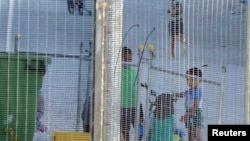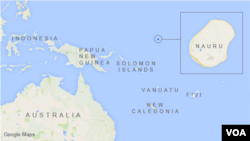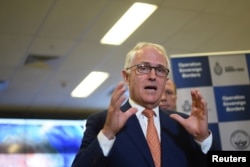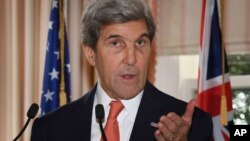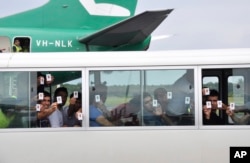Some refugees held in controversial Australian-run camps in the South Pacific will be resettled in the United States. Speaking in Canberra, Prime Minister Malcolm Turnbull said it would be a “one-off” deal.
Under tough border security laws, asylum seekers intercepted trying to reach Australia by boat are sent to migrant centers at Manus Island in Papua New Guinea and the tiny republic of Nauru. They are forbidden from being resettled in Australia as part of strict policies aimed at deterring unauthorized boat arrivals that have been reduced to barely a trickle in recent years. Conditions in the centers have been repeatedly criticized as inhumane by campaigners.
Refugees in the camps have celebrated Australia’s resettlement deal with the United States. One said the “nightmare” of life in detention would soon be over, but many uncertainties remain. Officials have not said how many of the 1,200 migrants held in camps in the South Pacific would be allowed into the U.S., or when the process would begin.
Australian Prime Minister Malcolm Turnbull made the announcement Sunday in Canberra.
“The agreement is with the United States," he said. "It is a one-off agreement. It will not be repeated. It is only available to those currently in the regional processing centers. It will not be available to any persons who seek to reach Australia in the future. Our priority is the resettlement of women, children and families. This will be an orderly process. It will take time, it will not be rushed.”
Amnesty International said it was worried about the lack of information around the timeline and the number of refugees to be processed.
U.S. Secretary of State John Kerry, who is in New Zealand, has confirmed the arrangement, but it was not clear if the agreement will be honored by President-elect Donald Trump. He has previously stressed he would crack down on immigration. Trump has also threatened to ban Muslims from entering the United States. Many of the detainees held on Manus Island in Papua New Guinea and Nauru come from Afghanistan and Iraq.
Australia said its navy would continue to stop and turn away any asylum seeker boats trying to reach its territorial waters.
The detention of asylum seekers is broadly supported by the majority of Australians, but the issue is deeply divisive. Critics of the strict policies argue that Australia is breaching its international obligations.
Canberra currently offers refugee visas to about 14,000 people under various global conventions each year.




